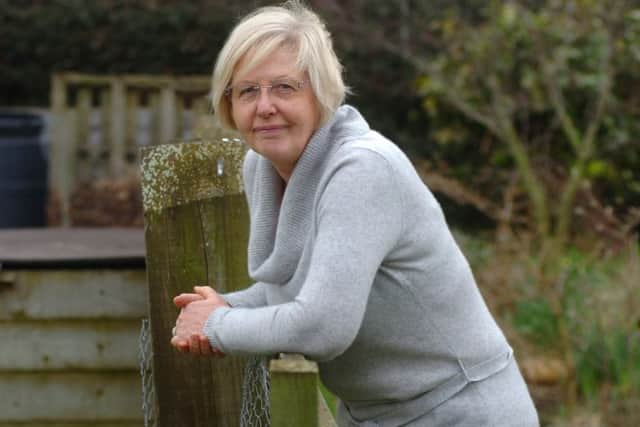Dementia carers are paying the price of love


The statistics for dementia make for stark and uncomfortable reading. It is estimated that 225,000 people will develop dementia in the UK this year – that’s one person every three minutes.
While, according to Public Health England, as many as 59 per cent of people know someone who has dementia.
Advertisement
Hide AdAdvertisement
Hide AdThat’s the scale of the challenge we face when we talk about dementia – it has become a modern scourge and it isn’t going to go away.


This isn’t something we have just suddenly woken up to. The UK already has a National Dementia Strategy and in 2015 the Government announced that £300m would be spent on research into dementia, including the creation of an international dementia institute in England in a bid to make the UK a world leader for research and medical trials.
But while this money and the dedicated teams of researchers working hard to find ways of halting the remorseless march of this dreadful disease is vitally important, it is the carers, the family members and friends looking after those living with dementia who are on the frontline day in and day out.
There are at least 670,000 dementia carers in the UK and without them we would surely have a crisis on our hands.
Advertisement
Hide AdAdvertisement
Hide AdJudith King, Regional Operations Manager for Alzheimer’s Society in the North of England, says carers of people with dementia bear the bulk of the financial burden. “The issue of funding of care and support affects everyone with dementia, their carers and families. The costs involved in caring for someone with dementia can place a huge burden on family finances.


“Alzheimer’s Society has campaigned for many years to end what we call the ‘dementia tax’. At present, two-thirds (£17.4 bn) of the cost of dementia is paid by people with dementia and their families, either in unpaid care (£11.6 bn) or in paying for private social care.
“This is in contrast to other conditions, such as heart disease and cancer, where the NHS provides care that is free at the point of use.”
King says people with dementia are willing to contribute to the cost of their care, but they want a system that shares this cost between them and the state.
Advertisement
Hide AdAdvertisement
Hide Ad“Local authorities are still continuing to slash social care budgets and it’s those who are most vulnerable who suffer the consequences. With growing numbers of people being diagnosed – in less than ten years a million people will be living with dementia – the government has to face up to the implications of an underfunded social care system that are staring us all in the face and invest in the system before it reaches crisis point.”
A Government spokesman said that nearly £900m of additional funding over the next two years would be spent tackling the growing pressures on social care. But he added that money alone was not the solution, pointing out that many local authorities were already providing high-quality social care services within their budgets.
Jean Tottie is director and chairwoman of Life Story Network, a national community interest company which was launched in Leeds in 2010.
An occupational therapist by profession, she helped set up the network after her father George, who had dementia, died. “As a former carer who had worked 35 years in health and social care, who was confident and knowledgeable about the maze of local systems, nothing prepared me for caring for my dad,” she says.
Advertisement
Hide AdAdvertisement
Hide Ad“Although he died eight years ago I am still in touch with many carers and they still face an uphill struggle. There is a postcode lottery of services where some families can receive very good support following a diagnosis but others are left to fend alone.
“It must be remembered that when a diagnosis of dementia is made it is given not only to the person affected but also to the carer.”
The impact of being a carer can be profound one. “The majority of people with dementia are cared for at home by a relative or friend. The average age of (unpaid) family carers is between 60 and 65 years; many are much older and as the caring role is taken on the demands increase and the person caring for a person with dementia will experience a loss of confidence and self-esteem,” says Jean.
“Often, the carer will become the second patient needing care and support themselves as they tend to neglect their own needs when caring for a loved one.”
Advertisement
Hide AdAdvertisement
Hide AdIt’s a heart-breaking scenario and so, too, is that faced by carers when the person they’re looking after dies. “It can be difficult for former carers to re-orientate themselves back into the workplace and community as they experience social isolation and a loss of confidence, arising from disconnection from their friends, family and wider social networks.”
The number of carers of people with dementia is only likely to increase in line with the rising number of people diagnosed with dementia.
“With significant cuts to statutory funding, resulting in reductions in social care provision, it is critical to help keep this group of carers well so they can care for longer; the eligibility thresholds for social care are tougher so people will rely increasingly on the support of families and friends,” says Jean.
“We must also harness the experience of family carers so they can contribute to improving services and care that will support them and the person they care for.”
Advertisement
Hide AdAdvertisement
Hide AdThe question of how we should pay for dementia care in this country is a contentious one. Free health care for those with dementia revolves around memory services that provide assessment and diagnosis, medication where appropriate, and a link to a post-diagnostic support programme.
Jean believes with NHS and social care budgets under increasing strain it’s time the issue was re-evaluated. “My argument would be that providing support to carers so that they can care for longer is cheaper than paying for more NHS beds or care home beds.
“Such support to carers could start with an education programme and include a range of options for them to choose from as all families are affected differently.
“This could include a range of respite services from day care, gardening, clubs or overnight stays, social and peer support groups and importantly access to a skilled, trained, knowledgeable person who can offer advice as the dementia progresses towards end of life care.”
Advertisement
Hide AdAdvertisement
Hide AdJean says that while the introduction of the National Strategy has had a positive impact, there is still much more that needs to be done. “We are so far behind other conditions and yet the scale of the impact of dementia is much bigger.
“We must ensure that dementia remains a priority, but most of all we must listen to the people affected, both the person with dementia and their carer, as they are the experts with the solutions.”
Cost of dementia care in numbers
Dementia costs the UK around £26.3 billion, with an average cost of £32,250 per person.
Two thirds of the cost of dementia is paid by people with dementia and their families.
£4.3 billion is spent on healthcare costs.
Advertisement
Hide AdAdvertisement
Hide Ad£10.3 billion is spent on social care (publicly and privately funded).
£11.6 billion is contributed by the work of unpaid carers of people with dementia.
There are around 670,000 carers of people with dementia in the UK.
The Government has announced £150 million to develop a national Dementia Research Institute and is investing £50 million to make hospitals and care homes dementia friendly.